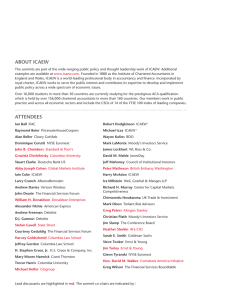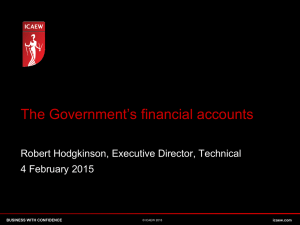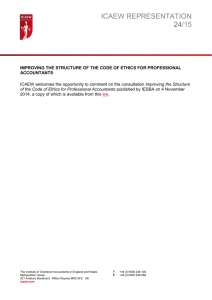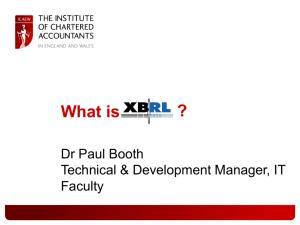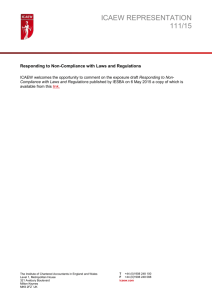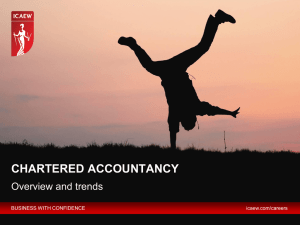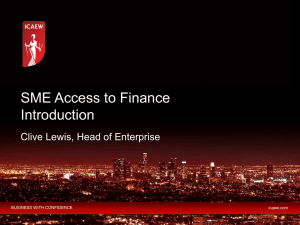IFS Green Budget 2016 Ross Campbell, Director, Public Sector, ICAEW
advertisement
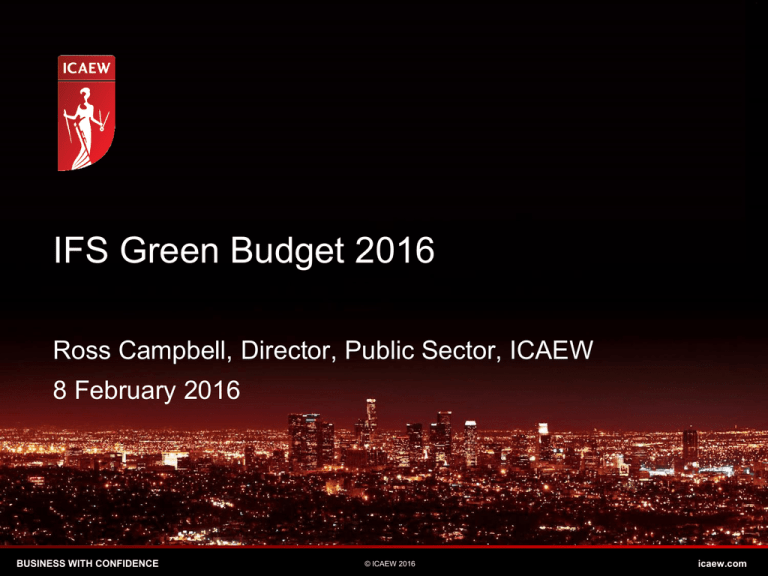
IFS Green Budget 2016 Ross Campbell, Director, Public Sector, ICAEW 8 February 2016 BUSINESS WITH CONFIDENCE © ICAEW 2016 icaew.com To make good decisions, understand your finances Five years of Whole of Government Accounts (WGA) • Provides insights not available from the National Accounts • But – takes too long to produce – lack of comprehensive monthly financial reports Infrastructure funding • The Chancellor’s dilemma – how to improve the public finances and increase investment at the same time • How hard is it to encourage private sector investment? • Is it time to bring PFI on balance sheet? • And instead prioritise investments that pay for themselves? BUSINESS WITH CONFIDENCE © ICAEW 2016 icaew.com Five years of integrated financial accounts Comprehensive Income Revenue & Expenditure Movements In Financial Position Balance Sheet Cash Flow Statement BUSINESS WITH CONFIDENCE © ICAEW 2016 icaew.com Five years of Whole of Government Accounts Revenue & Expenditure for 2013–14 Revenue Balance Sheet at 31 March 2014 Assets Expenditure Liabilities Property, plant & equipment £648bn Operating expenditure £763bn Debt Other assets £1,451bn £574bn £718bn Pensions £1,302bn Net finance costs £79bn Other liabilities £149bn £436bn Net liabilities Accounting deficit BUSINESS WITH CONFIDENCE £1,852bn © ICAEW 2016 icaew.com Five years of accounting deficits Public finance deficit Accounting deficit £200bn £150bn 20% lower than 2009-10 £100bn £196bn £188bn £185bn £179bn £153bn £135bn £1,185bn £120bn £114bn £100bn £50bn £0bn 35% lower than £149bn 2009-10 * 2009-10 2010-11 2011-12 2012-13 2013-14 * Accounting deficits in 2009-10 and 2010-11 exclude one-off items. BUSINESS WITH CONFIDENCE © ICAEW 2016 icaew.com Five years of balance sheets Liabilities Assets Particular concerns • Asset write-downs £1.2 trillion £1.2 trillion £1.3 trillion £1.3 trillion £1.3 trillion • Increasing pension obligations • Provisions for nuclear decommissioning & clinical negligence £2.4 trillion £2.5 trillion • Vulnerability to future economic shocks £179bn £2.6 trillion £2.9 trillion £3.2 trillion £149bn £100bn (177% of GDP) 2009-10 2010-11 2011-12 * 2012-13 35% lower than 2009-10 20% lower than 2009-10 2013-14 * Accounting deficits in 2009-10 and 2010-11 exclude one-off items. BUSINESS WITH CONFIDENCE © ICAEW 2016 icaew.com Five years of improvement, but … Significant progress • Preparation time from 2 years down to 12 months • Increased standardisation of accounting across the public sector • WGA starting to be used to support decision making But more to do … • Target of 9 months not achieved (v. 3 months in the private sector) • Finance systems still disjointed and inflexible – just as devolution accelerates • Lack of comprehensive monthly internal financial reporting Its time … • To embed WGA into the financial foundations of Whitehall • For a modern financial consolidation system – to enable reporting within days not months BUSINESS WITH CONFIDENCE © ICAEW 2016 icaew.com Infrastructure funding – a fiscal dilemma • How to increase infrastructure funding at the same time as sorting the public finances? • Fiscal charter rule = run a surplus = no new borrowing • Options: – Cut operational spending faster? – Bypass the fiscal charter through ‘off balance sheet’ PFI projects? – Encourage private sector investment? – Investments that pay for themselves? BUSINESS WITH CONFIDENCE © ICAEW 2016 icaew.com Flat public investment for next four years • Government investment plans relatively flat until 2018-19, before an increase in the last year of the parliament a Railways include HS2. b Housing association spending estimated by OBR Source: Autumn Statement 2015 and OBR November 2015. BUSINESS WITH CONFIDENCE © ICAEW 2016 icaew.com New PFI projects running at < £2 billion a year 9 90 Number of deals 8 80 Number of deals 2013–14 2012–13 2011–12 2010–11 2009–10 2008–09 2007–08 2006–07 0 2005–06 0 2004–05 10 2003–04 1 2002–03 20 2001–02 2 2000–01 30 1999–00 3 1998–99 40 1997–98 4 1996–97 50 1995–96 5 1994–95 60 1993–94 6 1992–93 70 1991–92 7 1990–91 Capital value (£bn) Capital value (£bn) Source: HM Treasury, PFI projects 2014 summary data, 15 December 2014. • PFI contracts are now only 2.9% of public sector net debt and neutral to the deficit – is it time to bring them on balance sheet? BUSINESS WITH CONFIDENCE © ICAEW 2016 icaew.com Infrastructure investment of £47 billion a year £50bn National Infrastructure Investment Pipeline Average annual spending 2015-16 to 2019-20 £45bn Private Public & public–private £40bn £35bn £30bn £25bn £20bn £15bn £10bn £5bn £0bn Energy Transport Water and other Total Source: March 2014 National Infrastructure Investment Pipeline (does not include housing, schools, hospitals or commercial buildings). BUSINESS WITH CONFIDENCE © ICAEW 2016 icaew.com Infrastructure funding – the story so far Less funding from banks • rebuilding their balance sheets Less funding from institutional investors • Monoline insurers – bust, so no AAA bonds anymore Increased costs • higher funding costs than before BUSINESS WITH CONFIDENCE © ICAEW 2016 icaew.com Government actions To get better value from PFI • PF2 contracts – better value for the taxpayer To provide regulatory or market incentives • Continued strong investment by price-regulated utilities • Growing investment in renewables – up until policy changed Reducing risk for investors • UK Guarantees to support lending (but only £1.7bn in first two years) Widening the pool of finance available • Pensions Infrastructure Platform (but less than £1bn in 4 years) • Planned collective vehicles for public sector pension funds BUSINESS WITH CONFIDENCE © ICAEW 2016 icaew.com Time for a sustainable approach? BUSINESS WITH CONFIDENCE © ICAEW 2016 icaew.com A world leader of the accountancy and finance profession BUSINESS WITH CONFIDENCE © ICAEW 2016 icaew.com
